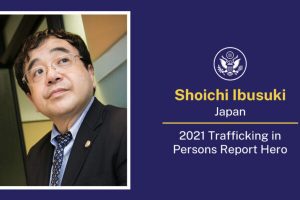
SNA (Tokyo) — On July 1, the US State Department cited Attorney Shoichi Ibuski as one of seven heroes in its 2021 Trafficking in Persons (TIP) report for his long years of work fighting for the rights of foreign workers caught up in Japan’s technical intern program.
The TIP report explained how domestic and overseas brokers continue to abuse this system, ostensibly to provide technical training to those from poorer countries, to exploit foreign workers. It went on to condemn the Japanese government for lacking the political will to investigate the system’s victims and provided them real protection.
Ibuski joined survivors, governmental, and NGO officials from Albania, the Central African Republic, Gabon, Kazakhstan, Mexico, Qatar, and Spain.
It started with an official system for trainees excluded from the normal protections of Japan’s labor laws. Ibuski made it his life’s work to show the public that they were in fact deprived of freedom and subject to strict control and orders by their bosses. These foreign workers provided cheap labor for farms and factories around the country, which were able to exploit them freely without having to worry about those pesky labor regulations.
Courts ruled that the trainees were in fact laborers protected by labor law in 2009. Ibuski’s first court victory pushed legislative reforms that abolished the position of “trainee” within the system. The remaining “technical interns” were recognized as workers protected by labor law from their first day of work in Japan.
I should add at this point that Ibuski is also my Tozen Union’s lawyer. Internecine squabbling led to the founding of our union in 2010. At that time, Ibuski was the only lawyer who openly committed to support the Tozen Union in our fight for workers’ rights. Indeed, he has followed through over the past eleven years, handling countless cases for us, not just as our attorney, but as a comrade, fighting alongside us even when things got messy.
Ibuski is the second Japanese recipient of this hero award; the first was Ippei Torii, the head of the Solidarity Network with Migrants Japan (Ijuren).
But how did the US government come to take it upon itself to judge the efforts of those fighting against human trafficking and awarding some among them as heroes? Some might answer that the United States is the self-appointed world’s policeman. That’s the brutal geopolitical reality, at least.
It goes back to 2000 and the passage of the Trafficking Victims Protection Act to prosecute and prevent trafficking while protecting victims and survivors. Each year since 2001, the State Department has issued a report and recognized heroes for their efforts against human trafficking.
My former work at Japanese NGOs supporting foreigners (including Ijuren) taught me that left activists learn quickly the awesome power and immediate effect of gaiatsu (outside pressure), particularly from the United States, to ameliorate conditions on the ground.
They experience the glacial pace of progress that comes from tenacious lobbying of politicians and the government. They also see how much faster it is to appeal directly to international organizations, and particularly to Washington. America’s Pacific poodle jumps to attention whenever the master scolds. Praise from the imperial center arouses excited and gleeful cheers among Japanese leftists who feel they have been recognized “by the world,” rather than by a single nation among more than two hundred.
Japan’s Chief Cabinet Secretary Katsunobu Kato and Minister of Justice Yoko Kamikawa both refused to comment, saying the report was independently drafted and it reflected US domestic legal standards.
The government should pay attention to the horrible situation technical interns continue to face without having to first hear their master’s voice. Ibuski himself commented that the technical intern system is nothing short of “modern slavery” and it cannot be fixed with a bit of fiddling around the edges. His goal is its abolition. But even a hero like Ibuski cannot achieve this on his own. If we are to help him achieve his goal, then this is no time to celebrate Ibuski’s hero award.
This article was written by Hifumi Okunuki, and originally
published by the Shingetsu News Agency (SNA).


Comments are closed